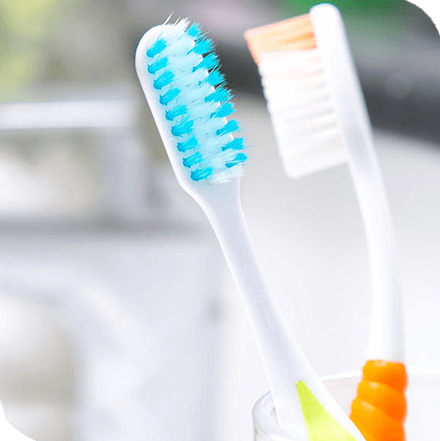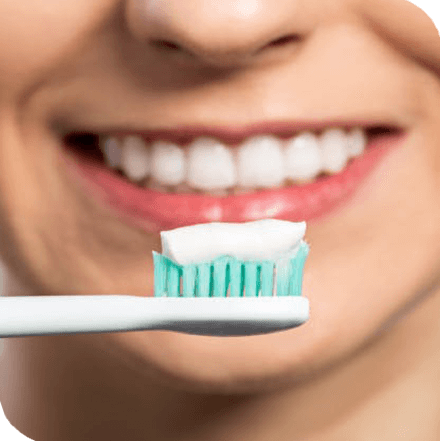
Almost everyone has experienced a toothache sometime in their life. At its most basic, a toothache is defined as discomfort in or around a tooth. Whether you’ve experienced discomfort from clenching your jaw too hard or from a cavity, there are a wide variety of causes. In this article, we will go over some of the most common causes to help you figure out what may be causing yours.
Tooth Sensitivity
If you find yourself wincing when eating something very hot or cold, you're probably dealing with tooth sensitivity.1 The discomfort can range from extremely mild to severe.1 If your tooth sensitivity worsens or lasts longer than usual, it's time to see a dentist. Depending on your symptoms, your dentist may offer different treatment options.1 One way to help prevent sensitive teeth is to brush twice a day, or using a toothpaste made for sensitive teeth, such as Sensodyne.
Tooth sensitivity is usually caused by either enamel wear or gum recession.4 When enamel wears away, it exposes the soft inner part of your tooth called dentin.4 This dentin houses microscopic channels that run towards the nerves which can cause tooth sensitivity.4 Swollen gums and early gum problems can also lead to exposed dentin. If you are experiencing tooth sensitivity caused by exposed dentin, try brushing with Sensodyne Sensitivity and Gum, a toothpaste that relieves tooth sensitivity and improves gum health at the same time*
*with twice daily brushing.
Tooth Grinding
In some cases, tooth discomfort can be caused by grinding teeth, or bruxism. Some people grind and grit their teeth together without being aware of it, which can cause stress to the teeth and jaw.6 It can happen subconsciously during the day out of stress or even at night when sleeping. People who clench or grind their teeth during sleep are likely to have other sleep disorders like snoring or sleep apnea.6 Teeth grinding at night can be even more problematic because it can be harder to manage and stop. Continual teeth grinding can damage your teeth, restorations or jaw, as well as cause tension-type headaches and severe facial or jaw discomfort.6 A dentist may be able to give you some advice on how to manage teeth grinding if it's causing you discomfort.
Cavities
Another very common reason for tooth discomfort are cavities. You've probably experienced getting a filling or two to repair them. Bacteria in your mouth use the sugars you eat to make acids which can lead to a hole forming in the enamel- the hard outer surface of your tooth.7 If left untreated, the hole can progress to the innermost part of the tooth, the nerve, causing the tooth to be inflamed, abscessed and sore.3
Cracked Tooth or Loose, Broken Fillings
Whether your teeth get cracked from trauma, such as eating something too hard, or from grinding them, a cracked tooth may cause soreness and inflammation and abscess.3 The crack can often be too small to be seen with your eyes. Loose or broken fillings can also cause tooth discomfort or tooth abscess. Seek proper treatment and care from a dentist for a cracked tooth or broken filling, as these can lead to more serious issues.3
Tooth Abscess
This tooth discomfort is caused by an infection in the tooth. An abscess is a collection of pus at the end of your tooth root that's caused by a bacterial infection and can spread into the surrounding tissue and bone. This can cause constant and severe discomfort, pressure and inflammation.3 Your jaw and gums may also be sensitive to the touch.3 If you suspect you have a tooth abscess, you should see your dentist as soon as possible.
When to See Your Dentist for Toothache
There are even more reasons for toothache than those listed above, but these are some of the most common you might encounter. Most are manageable conditions and can be treated by a dentists. To find out the root cause of your particular toothache, it's best to go see a dentist for a routine check-up.
As a general rule, talk to your dentist if you're experiencing intense discomfort in your teeth/jaw that doesn’t stop or decrease after a few days. To learn more about general tooth sensitivity, check out our Oral Health Tips.
Sources:
- Toothaches. MedlinePlus. https://medlineplus.gov/ency/article/003067.htm/ Accessed 5/5/2021.
- TMJ Disorders. MedlinePlus. https://medlineplus.gov/ency/article/001227.htm Accessed 5/5/2021.
- Toothache. Northern Ireland Direct. https://www.nidirect.gov.uk/conditions/toothache/ Accessed 5/5/2021.
- Sensitive Teeth: Causes and Treatment. https://www.ada.org/~/media/ADA/Publications/Files/patient_33.pdf?la=en. Accessed on 9/9/2021.
- Periodontitis. https://www.mayoclinic.org/diseases-conditions/periodontitis/symptoms-causes/syc-20354473. Accessed on 9/9/2021.
- Bruxism (Teeth Grinding). https://www.mayoclinic.org/diseases-conditions/bruxism/symptoms-causes/syc-20356095. Accessed on 9/9/2021.
- How do We Prevent Cavities. https://www.mouthhealthy.org/en/dental-care-concerns/how-do-we-prevent-cavities. Accessed on 11/16/21.




